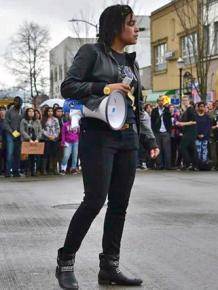Living with the scars of slavery
Students at the three University of Washington (UW) campuses--Seattle, Tacoma, and Bothell--organized a walkout on February 25 to protest the lack of diversity at UW. At the Seattle campus alone, more than 1,000 students, staff, faculty and community members marched and rallied for three-and-a-half hours. Members of Outside Agitators 206 (OA206), a Black Lives Matter group in Seattle, as well as students from various departments and campus organizations, organized the day's actions.
The administration has already told students that it will soon meet key organizers and submit a written response to their demands. Meanwhile, students continue organizing. At least three different meetings will take place this week: one for graduate students to discuss how to support the Black Lives Matter movement; another to build a coalition against future budget cuts and tuition hikes; and the UW State of Emergency meeting organized by the Black Student Union. Among other issues, it will discuss repealing I-200, an anti-affirmative action initiative passed by Washington state voters in 1998.
During the walkout, UW senior addressed the crowd about the issue of affirmative action, the racist reality faced by African Americans today and the importance of pressuring institutions of power to demand change. Tekola is a project intern with Washington Leaders for Conversations about Climate and an activist with Divest UW, a student group demanding that UW divest from fossil fuels. Here, we reprint her speech.
FIRST OFF, I just want to acknowledge that we are standing on stolen Duwamish land.
My name is Sarra Tekola. I'm a senior here. I'm also a member of Divest UW. We are working to get UW to stop investing in fossil fuels because these companies are ruining our future.
Dr. King once said, "Our freedom is inextricably bound to the freedom of every soul on earth." Black Lives Matter because until Blacks are free from a racist, classist system, we all suffer. Wherever the conditions are the worst, that is where you find us; that is why when you improve Black lives, you improve society.
Black people have been subjected to the worst conditions, redlined to the poorest of neighborhoods, with the worst pollution, most destitute schools, the greatest amount of hazards, the least amount of transit. We have the highest rates of asthma, diabetes, hypertension and heart disease.
And if we are lucky enough to escape death by poverty diseases, we still have to face being 22 times more likely to be shot by the police. And even if we escape these challenges, one in three Black men are in jail, and Black women are the most likely to receive subprime mortgage loans, leading them to have the highest rate of foreclosures on their homes.

And yet we still have some white people, mad about affirmative action, as if the playing field is equal, as if the hurdles we were born into were the same. Our mere existence, as Black people, is in itself resistance! Being on campus is resistance, staying out of jail, staying alive is resistance.
I once heard someone tell me that racism is over because all the racists are dead. The thing is that even if that was true, which it's not, the racist institutions still stand, and they are still playing by the same racist status quo. Diversity does not just happen. Diversity takes effort.
The stains from the 400 years of slavery, the First Nations who were kicked off their land, the colonization of Central and South America, Africa and India will not wash out overnight. We are living with the scars of colonialism, exploitation and slavery, we are living with intergenerational trauma, we are not all coming to the table with equal pieces, and yet we are being judged equally on an unfairly tipped scale--then they wonder why they ended up with an all-white faculty.
In 1998, Initiative 200 (I-200) was passed, banning affirmative action. Since then, the number of underrepresented minorities has decreased statewide. Some populations of minorities, including Filipinos, have not rebounded since the passing of this racist law. But the good news is that I-200 can be repealed.
All it takes is a simple act by the legislature, but it will not happen without our pushing. This will not be a priority until we make it their priority. We have to build the momentum by gathering support from institutions, such as ours, and corporations, because diversity helps everyone. It is in all of our benefit to fight for this.
We have to call write and visit our representatives to make sure they are aware of what we need. Our school president is changing; we need to be at that table to make sure diversity and access are two of their core principles. I-200 will not be repealed without our institution's desire for it to be repealed, and that desire will not be there unless we apply pressure to the institution as we are doing here now.
So join us in making history--during Black History Month and beyond!


